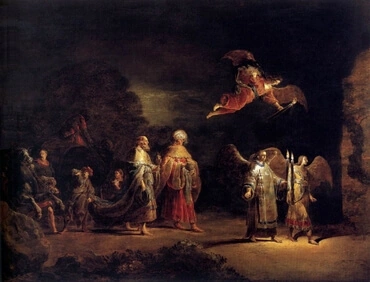1
I saw the Lord standing upon the altar: and he said, Smite the lintel of the door, that the posts may shake: and cut them in the head, all of them; and I will slay the last of them with the sword: he that fleeth of them shall not flee away, and he that escapeth of them shall not be delivered.
2
Though they dig into the place of the dead, thence shall my hand take them; though they climb up to heaven, thence will I bring them down:
3
And though they hide themselves in the top of Carmel, I will search and take them out thence; and though they are hid from my sight in the bottom of the sea, thence will I command the serpent, and he shall bite them:
4
And though they go into captivity before their enemies, thence will I command the sword, and it shall slay them: and I will set my eyes upon them for evil, and not for good.
5
And the Lord GOD of hosts is he that toucheth the land, and it shall melt, and all that dwell in it shall mourn: and it shall rise up wholly like a flood; and shall be drowned, as by the flood of Egypt.
6
It is he that buildeth his stories in the heaven, and hath founded his troop in the earth; he that calleth for the waters of the sea, and poureth them out upon the face of the earth: the LORD is his name.
7
Are ye not as children of the Cushites to me, O children of Israel? saith the LORD. Have not I brought up Israel from the land of Egypt? and the Philistines from Caphtor, and the Assyrians from Kir?
8
Behold, the eyes of the Lord GOD are upon the sinful kingdom, and I will destroy it from off the face of the earth; saving that I will not utterly destroy the house of Jacob, saith the Lord.
9
For lo, I will command, and I will sift the house of Israel among all nations, like as corn is sifted in a sieve, yet shall not the least grain fall upon the earth.
10
All the sinners of my people shall die by the sword, who say, The evil shall not overtake nor fall upon us.
11
In that day will I raise up the tabernacle of David that is fallen, and close up their breaches; and I will raise up its ruins, and I will build it as in the days of old:
12
That they may possess the remnant of Edom, and of all the heathen, who are called by my name, saith the LORD that doeth this.
13
Behold, the days come, saith the LORD, that the plowman shall overtake the reaper, and the treader of grapes him that soweth seed; and the mountains shall drop sweet wine, and all the hills shall melt.
14
And I will bring again the captivity of my people of Israel, and they shall build the waste cities, and inhabit them; and they shall plant vineyards, and drink the wine of them; they shall also make gardens, and eat the fruit of them.
15
And I will plant them upon their land, and they shall no more be pulled up out of their land which I have given them, saith the LORD thy God.







